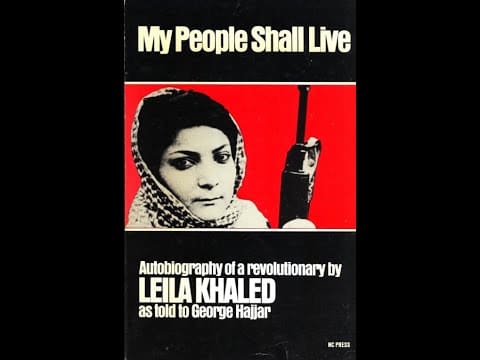
“I as a citizen of Haifa, am not allowed to bask in its sun, breathe its clear air, live there with my people”– Leila Khaled
‘My People Shall Live’ is the autobiography of the PFLP (Popular Front for the Liberation of Palestine) revolutionary Leila Khaled who attempted two plane hijacks- TWA Flight 840 and El-Al Flight 219 in 1969 and 1970 in order to free her people who were being held as prisoners in Israel, as well as bring the Palestinian cause to the forefront. The book, originally published in 1973, was edited by George Hajjar.
The book vividly portrays how the political atmosphere in the Middle East shaped her life and beliefs compelling her to take up armed resistance. In her autobiography, she unveils not only the formidable influence of imperialist Zionist and Western forces but also exposes the fractures within the Arab society, exacerbated by the presence of corrupt monarchies.
The book is divided into three parts: “The Badge of Infamy – Deprivation and Discovery,” detailing her early life and political awakening as a Palestinian refugee; “The Declaration of a New Humanity – Resistance and Revolution,” chronicling her journey as a PFLP guerrilla soldier and her hijacking missions; and finally, the conclusion, which delves into the complex geopolitical dynamics of the Palestinian liberation struggle in the early 1970s, highlighting Palestinian resilience amidst betrayal and geopolitical maneuvering by the West and the Arab states.
Leila Khaled was four when she was displaced from her house in Haifa under violent circumstances. It took place on April 13, 1948, four days after her birthday. It was on this day that she first witnessed the death of a man whose blood gushed out from his stomach. Initially terrified, this encounter transformed death into a symbol of resistance and martyrdom for her. Throughout her life, she would confront death multiple times, even losing some of her dearest comrades.
Leila grew up in Sour as a refugee and like most other refugee kids, having the bare minimum was a luxury. As a Palestinian woman, politics was an indispensable part that seeped into every aspect of her life.
“Palestine is not politics to me, it is a question of life and death.”
Leila Khaled became associated with the Arab Nationalist Movement (ANM), marking her first involvement with organized resistance against oppression. Her responsibilities were limited to protests, meetings, demonstrations, and educational awareness but she was prepared to take on more. Despite facing barriers as a woman, she remained resolute in her pursuit of military training, challenging gender norms and exemplifying her steadfast dedication to the Palestinian cause. She subsequently became a member of Fateh and finally the PFLP.
Leila Khaled’s dedication to the revolution surpassed her individual needs and social obligations. It couldn’t be constrained even in the strictly apolitical environment of the American University of Beirut where she studied or the school in Al Jahrah, Kuwait where she worked as a teacher and where politics took a backseat.
Khaled’s predecessor was Amina Dhahbour, the first Palestinian woman who hijacked an El-Al plane on February 18, 1969. When the news broadcast reached Leila, she felt a new sense of belonging and hope for the revolution. It paved the way for her participation in foreign military operations.
When Leila Khaled hijacked the TWA Flight 840 on August 29, 1969, she revisited her city Haifa for the first time in twenty-one years. This was the closest she had come to her homeland since the Nakba. During her entire mission, Khaled didn’t hurt a single passenger as the hijack was implemented purely for its political value. However, this was not reciprocated during her second hijack when her comrade was killed and she was repeatedly thrashed by the Israeli guards.
“In dying for Palestine you have become the symbol that lightens our oppression; you have also become the joyous burden that propels us onward to end that oppression.”
-Leila Khaled in her note to Patrick Arguello, her fallen comrade
‘My People Shall Live’ affirms the faith of a Palestinian for all her people. The book traces a woman’s transformation into a revolutionary in a decadent setting where the people in positions of power have no regard for the will of the masses and are only interested in maintaining their regional sovereignty and amassing more power. Leila Khaled’s legacy echoes in the ongoing resistance against occupation, a beacon guiding today’s struggle for liberation and justice.



